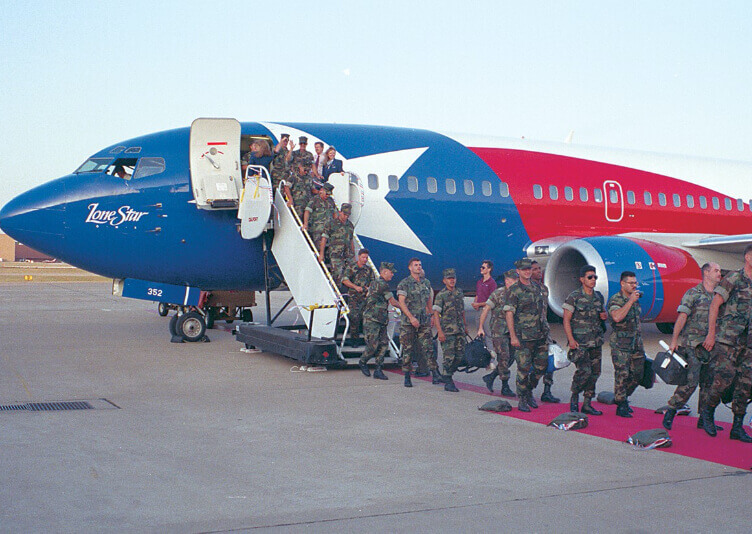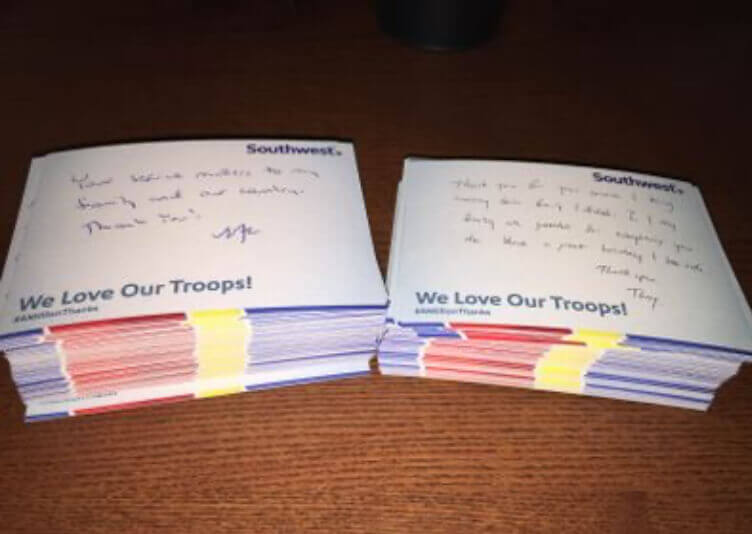
Founder Herb Kelleher and General Duncan McNabb, Air Mobility Command Commander, visit with a wounded serviceman in 2007 at Andrews Air Force Base, Maryland.
At Your Service: Honoring Our Military Heroes
Let’s try to find ways to say thank you. That was always Founder Herb Kelleher’s guiding principle when it came to recognizing members of the U.S. Military. See them. Respect them. Hire them. Support them. In short, show your gratitude with acts of kindness, large and small, whenever and wherever possible.
Herb didn’t just promote these principles; he lived them. When President George W. Bush phoned Herb and asked if he could help the Air Force iron out a set of bullet points that defined great leadership, Herb jumped at the opportunity. He cleared his schedule, hopped on an airplane, and found himself huddled up in a room full of generals intent on discussing everything from complex logistics to the psychology of great leaders.
Herb made quite an impression on one of the Air Force’s top brass, General Duncan McNabb, which produced an enduring friendship that lasted the rest of Herb’s life.
“Herb and [Gen. McNabb] became like brothers, I mean literally,” says President Emeritus Colleen Barrett. “They became the closest friends you can imagine.” The two men regularly made the rounds together, often visiting wounded warriors recovering at veterans hospitals across the country. Herb possessed an almost magical ability to evoke smiles, even from the most seriously injured of soldiers; while they invariably drew the very deepest laughs and best stories out of Herb.
That was the Kelleher way. Charming and disarming at every turn. No one did it better. Of course, Southwest showed its gratitude as a Company in its own ways, albeit with just as much Heart. That’s been evident from the earliest days, when it welcomed Vietnam vets to join the Southwest Family at a time when some employers overlooked—if not outright shunned—them.
Southwest did the opposite: It recruited them. In fact, the Company employed so many vets during the 1970s—including many who’d served in World War II and Korea—that it later gained the reputation for being the second most-decorated air force in the world.

When Southwest transports fallen soldiers to their final resting place, it ensures their final flights are completed with the grace and respect the soldiers deserve.
Empathy aside, it was a good business decision, given the unique skill sets and discipline that vets brought to the Company. “They’d been hardened by the battle experience—the exposures that they’d had in the field in the service,” Herb declared, decades later. “And we thought that was good preparation for the ‘battles’ we were going to have to go through at Southwest Airlines.”
To underscore that rapidly maturing Warrior Spirit, Southwest used backdrops of U.S. battleships and military installations for early publicity photos. Then during the 1980s, the Company introduced special military fares and joined local airline ticket distribution systems on military bases, hoping to offer members of the military a wider array of affordable flight options.
It wasn’t until the outbreak of the Gulf War in 1990 that some of Southwest’s own Employees were called into active duty and sent overseas for military combat. Intent on boosting morale, civilian Employees penned notes and letters as part of a Companywide LUVGrams program, vowing to greet American soldiers with open arms upon their return home.
On October 17, 1991, Southwest made good on that promise when 99 soldiers flew into Dallas from California. Crowds of enthusiastic, flag-waving Southwest Employees met them, providing them the homecoming they deserved.

Flag-waving Southwest Employees greeted a plane full of Gulf War veterans when they arrived in Dallas in October 1991.
In the decades to follow, the Company’s commitment to saying “thank you” and honoring the service and sacrifices of the military never wavered. Whenever U.S. forces were dispatched on military campaigns, Southwest did its best to ease the burdens of war and remind U.S. soldiers what they were fighting for.
This was particularly true in 2007, when Southwest launched two Companywide initiatives to remind members of the U.S. Armed Forces that it had their backs. In typical Southwest fashion, the Operation Phone Home program helped troops reconnect with those who are most important in their lives by sending prepaid phone cards to 3,928 soldiers on active duty. This effort raised $55,000 through contributions from Employees and Customers, far exceeding the $20,000 goal, and produced more than 1 million minutes of talk time with friends and family—calls that many recipients said was the single most important gift they could have received.
For the second program, dubbed LUV Rations, Southwest Employees purchased and boxed up everyday necessities—from sunscreen to socks—and shipped them to troops stationed in the Middle East, making sure to add toys and stuffed animals for children in Iraq and Afghanistan. Southwest continues to support the families of military Employees during deployment via its Internal Customer Care Team as well as providing donations to an array of military-focused nonprofits. The Company’s unwavering partnership with the Honor Flight Network, for instance, offers veterans complimentary transportation to Washington, D.C., to tour the nation’s monuments and war memorials. And in a natural extension of its Southwest LUVGrams program, Southwest partners with A Million Thanks Inc., to send We Love Our Troops postcards to deployed soldiers around the globe, especially for Veterans Day.

Some of the We Love Our Troops postcards written to express gratitude to troops overseas.
Beyond all these programs, perhaps the Company’s most lasting effort remains its steadfast commitment to actively recruiting and employing current and former members of the military. A shared belief in the value of Teamwork and a desire to serve a cause greater than oneself makes Southwest and the military a natural fit, which explains why nearly 18 percent of the Company’s workforce has a military background. Now Onboarding classes, we recognize vets. Those who self-identify as a vet receive a pin to designate their military service as both a symbol of our gratitude for Employees who serve or have served in America’s military forces and also a designation for Customers and fellow Employees to be able to recognize this service,” says Andrew Watterson, Executive Vice President & Chief Commercial Officer, and an veteran who served in the U.S. Army. “Our work hard, play hard mentality at Southwest is very similar to the family atmosphere in the military.”
And yet, to the credit of these former soldiers, they continue to find ways to give more than they receive. Every single day, at airports and within Southwest facilities, military veterans fly Southwest planes, maintain its aircraft, and support its Customers with the sense of duty and professionalism that they continually show their country.
As far as Southwest is concerned, it’s proof that there are plenty of heroes to be found, if you just know where to look for them. As former Vice President Operational Coordination Chuck Magill, a retired U.S. Marine, has said: “The freedoms we enjoy don’t come without the sacrifices of veterans, our military service men and women, and their families.” And for that service and the countless sacrifices made, Southwest is—and will always be—grateful.
